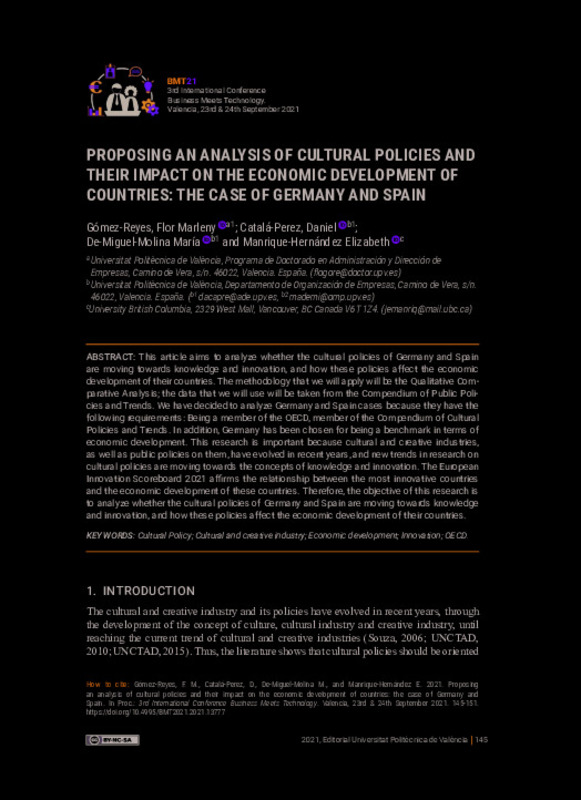JavaScript is disabled for your browser. Some features of this site may not work without it.
Buscar en RiuNet
Listar
Mi cuenta
Estadísticas
Ayuda RiuNet
Admin. UPV
Proposing an analysis of cultural policies and their impact on the economic development of countries: the case of Germany and Spain
Mostrar el registro sencillo del ítem
Ficheros en el ítem
| dc.contributor.author | Gomez Reyes, Flor Marleny
|
es_ES |
| dc.contributor.author | Catalá Pérez, Daniel
|
es_ES |
| dc.contributor.author | Miguel Molina, Maria Rosario de
|
es_ES |
| dc.contributor.author | Manrique-Hernández, Elizabeth
|
es_ES |
| dc.date.accessioned | 2022-10-13T06:50:51Z | |
| dc.date.available | 2022-10-13T06:50:51Z | |
| dc.date.issued | 2022-02-21 | |
| dc.identifier.isbn | 9788490484173 | |
| dc.identifier.uri | http://hdl.handle.net/10251/187551 | |
| dc.description.abstract | [EN] This article aims to describe the analitycal framework in which it will be analyzed whether the cultural policies of Germany and Spain are moving towards knowledge and innovation, and how these policies affect the economic development of their countries. The methodology that we will apply will be the Qualitative Comparative Analysis; the data that we will use will be taken from the Compendium of Public Policies and Trends. We have decided to analyze Germany and Spain cases because they have the following requirements: Being a member of the OECD, member of the Compendium of Cultural Policies and Trends. In addition, Germany has been chosen for being a benchmark in terms of economic development. This research is important because cultural and creative industries, as well as public policies on them, have evolved in recent years, and new trends in research on cultural policies are moving towards the concepts of knowledge and innovation. The European Innovation Scoreboard 2021 affirms the relationship between the most innovative countries and the economic development of these countries. Therefore, the objective of this research is to analyze whether the cultural policies of Germany and Spain are moving towards knowledge and innovation, and how these policies affect the economic development of their countries. | es_ES |
| dc.format.extent | 7 | es_ES |
| dc.language | Inglés | es_ES |
| dc.publisher | Editorial Universitat Politècnica de València | es_ES |
| dc.relation.ispartof | Proceedings 3rd International Conference. Business Meets Technology | |
| dc.rights | Reconocimiento - No comercial - Compartir igual (by-nc-sa) | es_ES |
| dc.subject | Cultural Policy | es_ES |
| dc.subject | Cultural and creative industry | es_ES |
| dc.subject | Economic development | es_ES |
| dc.subject | Innovation | es_ES |
| dc.subject | OECD | es_ES |
| dc.title | Proposing an analysis of cultural policies and their impact on the economic development of countries: the case of Germany and Spain | es_ES |
| dc.type | Capítulo de libro | es_ES |
| dc.type | Comunicación en congreso | es_ES |
| dc.identifier.doi | 10.4995/BMT2021.2021.13777 | |
| dc.rights.accessRights | Abierto | es_ES |
| dc.contributor.affiliation | Universitat Politècnica de València. Facultad de Administración y Dirección de Empresas - Facultat d'Administració i Direcció d'Empreses | es_ES |
| dc.contributor.affiliation | Universitat Politècnica de València. Departamento de Organización de Empresas - Departament d'Organització d'Empreses | es_ES |
| dc.description.bibliographicCitation | Gomez Reyes, FM.; Catalá Pérez, D.; Miguel Molina, MRD.; Manrique-Hernández, E. (2022). Proposing an analysis of cultural policies and their impact on the economic development of countries: the case of Germany and Spain. En Proceedings 3rd International Conference. Business Meets Technology. Editorial Universitat Politècnica de València. 145-151. https://doi.org/10.4995/BMT2021.2021.13777 | es_ES |
| dc.description.accrualMethod | OCS | es_ES |
| dc.relation.conferencename | 3rd International Conference. Business Meets Technology | es_ES |
| dc.relation.conferencedate | Septiembre 23-24, 2021 | es_ES |
| dc.relation.conferenceplace | Valencia, España | es_ES |
| dc.relation.publisherversion | http://ocs.editorial.upv.es/index.php/BMT/BMT2021/paper/view/13777 | es_ES |
| dc.description.upvformatpinicio | 145 | es_ES |
| dc.description.upvformatpfin | 151 | es_ES |
| dc.type.version | info:eu-repo/semantics/publishedVersion | es_ES |
| dc.relation.pasarela | OCS\13777 | es_ES |








